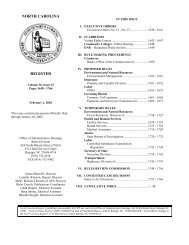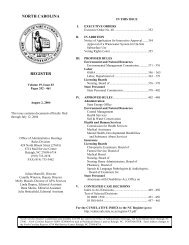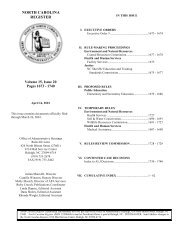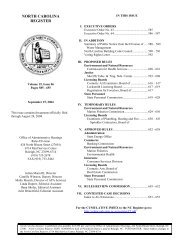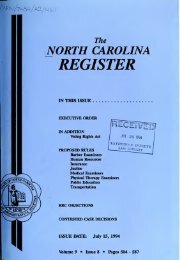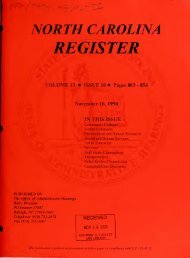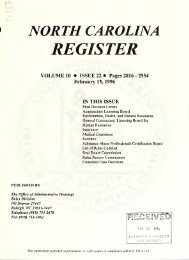NC Register Volume 21 Issue 09 - Office of Administrative Hearings
NC Register Volume 21 Issue 09 - Office of Administrative Hearings
NC Register Volume 21 Issue 09 - Office of Administrative Hearings
You also want an ePaper? Increase the reach of your titles
YUMPU automatically turns print PDFs into web optimized ePapers that Google loves.
APPROVED RULES<br />
History Note: Authority G.S. 90-6; 90-11;<br />
Eff. October 1, 2006.<br />
* * * * * * * * * * * * * * * * * * * *<br />
<strong>21</strong> <strong>NC</strong>AC 54 .2006 PSYCHOLOGICAL ASSOCIATE<br />
ACTIVITIES<br />
(a) The assessment <strong>of</strong> overall personality functioning by a<br />
psychological associate requires supervision. The assessment <strong>of</strong><br />
personality functioning involves any assessment or evaluative<br />
technique which leads to conclusions, inferences, and<br />
hypotheses regarding personality functioning. This includes:<br />
(1) all statements regarding personality attributes,<br />
features, traits, structure, dynamics, and<br />
pathology or assets;<br />
(2) the use <strong>of</strong> personality assessment techniques<br />
which include, but are not limited to,<br />
observation, interviewing, mental status<br />
examinations, word association tests,<br />
diagnostic play therapy, and autobiographical<br />
techniques; and<br />
(3) the use <strong>of</strong> standardized personality techniques<br />
or tests. Examples <strong>of</strong> techniques or tests<br />
include, but are not limited to, the following:<br />
Rorschach, Thematic Apperception Test,<br />
sentence completion tests, the House Tree<br />
Person, Minnesota Multiphasic Personality<br />
Inventory, the California Personality<br />
Inventory, The Millon tests, the 16PF, and all<br />
other self-report inventories and<br />
questionnaires, as well as scales and check<br />
lists completed by others. The tests identified<br />
in this Rule as requiring supervision do not<br />
constitute an exhaustive list, only the most<br />
commonly utilized measures.<br />
Not requiring supervision are screening techniques which lead to<br />
simple descriptors <strong>of</strong> persons which may be completed by a<br />
variety <strong>of</strong> pr<strong>of</strong>essional and non-pr<strong>of</strong>essional observers and are<br />
interpreted by other parties.<br />
(b) The conduct <strong>of</strong> neuropsychological evaluations by<br />
psychological associates requires supervision. Not requiring<br />
supervision are neuropsychological screenings which lead to<br />
simple behavioral descriptions rather than clinical<br />
interpretations, or the administration <strong>of</strong> rating devices which<br />
may be completed by a variety <strong>of</strong> pr<strong>of</strong>essional and nonpr<strong>of</strong>essional<br />
observers and are subsequently interpreted by other<br />
parties.<br />
(c) Psychotherapy, counseling, and any other interventions with<br />
a clinical population for the purpose <strong>of</strong> preventing or eliminating<br />
symptomatic, maladaptive, or undesired behavior provided by a<br />
psychological associate require supervision. Clinical populations<br />
include persons with discernible mental, behavioral, emotional,<br />
psychological, or psychiatric disorders as evidenced by an<br />
established Axis 1 or Axis II diagnosis or V Code condition in<br />
the then current DSM and all persons meeting the criteria for<br />
such diagnoses. Interventions other than psychotherapy and<br />
counseling that are encompassed by this definition include, but<br />
are not limited to, psychological assessment, psychoanalysis,<br />
behavior analysis/therapy, bi<strong>of</strong>eedback, and hypnosis.<br />
Supervision is required when the psychological associate is<br />
providing an intervention to persons within a clinical population,<br />
directly with the person(s) or in consultation with a third party,<br />
for the purpose <strong>of</strong> preventing or eliminating symptomatic,<br />
maladaptive, or undesired behavior. Supervision is required for<br />
the design or clinical oversight <strong>of</strong> interventions for persons<br />
within a clinical population, such as bi<strong>of</strong>eedback techniques and<br />
behavior intervention programs; however, supervision is not<br />
required for the actual implementation <strong>of</strong> such interventions that<br />
were designed for others to implement, which may or may not<br />
constitute ancillary services.<br />
(d) The use, including authorization, <strong>of</strong> intrusive, punitive, or<br />
experimental procedures, techniques, or measures by a<br />
psychological associate requires supervision. These procedures,<br />
techniques, or measures include, but are not limited to,<br />
seclusion, physical restraint, the use <strong>of</strong> protective devices for<br />
behavioral control, isolation time-out, and any utilization <strong>of</strong><br />
punishment techniques involving aversive stimulation. Also<br />
included in this definition are any other techniques which are<br />
physically intrusive, are restrictive <strong>of</strong> human rights or freedom<br />
<strong>of</strong> movement, place the client at risk for injury, or are<br />
experimental in nature (i.e., in which the efficacy and degree <strong>of</strong><br />
risk have not previously been clinically established).<br />
(e) Supervision is required for a psychological associate who<br />
provides clinical supervision to other service providers who are<br />
engaged in activities which would require supervision if directly<br />
provided by the psychological associate.<br />
History Note: Authority G.S. 90-270.5(e); 90-270.9;<br />
Eff. October 1, 1991;<br />
Amended Eff. October 1, 2006.<br />
TITLE 23 – DEPARMENT OF COMMUNITY COLLEGES<br />
23 <strong>NC</strong>AC 02C .02<strong>09</strong> EVALUATION OF PRESIDENTS<br />
(a) Methodology and Instrumentality. Each local board <strong>of</strong><br />
trustees shall evaluate the performance <strong>of</strong> its president annually.<br />
The evaluation instrument and methodology shall be selected by<br />
the local board, but the evaluation shall, at a minimum, include<br />
the following categories:<br />
(1) General administration;<br />
(2) Relationships including:<br />
(A) Internal relationships with faculty,<br />
(B)<br />
staff, students, and trustees; and,<br />
External relationships with business<br />
and industry, the media,<br />
governmental bodies, and the general<br />
public;<br />
(3) Personal attributes;<br />
(4) Personnel administration;<br />
(5) Fiscal and facilities administration; and,<br />
(6) Academic administration.<br />
(b) Reporting Requirements. Prior to June 30 <strong>of</strong> each year, each<br />
college board <strong>of</strong> trustees shall, in writing, notify the State Board<br />
<strong>of</strong> the following:<br />
<strong>21</strong>:<strong>09</strong> NORTH CAROLINA REGISTER NOVEMBER 1, 2006<br />
826




